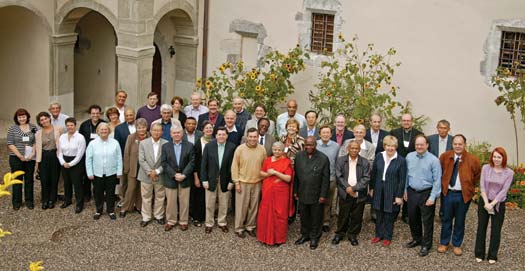 |
| Denis Vidalie |
Coming Together for the Greater Good
Conference promotes an international dialogue about civic engagement
They came from all over the world. At the invitation of Tufts president Lawrence S. Bacow, 28 college and university presidents, rectors, and vice chancellors, representing 22 nations and all of the inhabited continents on the planet, assembled at the Tufts University European Center in Talloires, France, from September 15 to 17, 2005, for the first of its kind international conference on civic engagement and social responsibility.
More than a year in the making, the conference focused on harnessing the power of people to make a difference in the world. Conference attendees were selected for their demonstrated commitment to active citizenship on both personal and institutional levels.
Prior to the meeting, participants offered detailed information about institutional activities, the political and economic realities in which their universities operate, best practices that they could share with others, and their desire for expanding outreach and engagement both for educational benefit and society’s betterment. The data laid a foundation for conference dialogue that was grounded in fact, forward looking, and oriented toward action.
President Bacow chaired the two-and-a-half-day conference with expert facilitation by Rob Hollister, dean of the University College of Citizenship and Public Service. Tufts’ president emeritus John DiBiaggio, co-founder of the University College and longtime leader within Campus Compact, a coalition that promotes community service, civic engagement, and service-learning in U.S. higher education institutions, added his insight to the proceedings as well.
An esprit de corps developed immediately among participants, who were captivated by the charm of Talloires and Tufts’ historic priory, and inspired by the prospect of mobilizing millions of university students, faculty, staff, and alumni to address pressing social issues. President Bacow recognized the enormous potential for social action represented by the group.
“It was clear that our work would be fueled by optimism,” said Bacow. “I watched my colleagues from nations in political conflict, side-by-side, engaging in animated conversation about cooperative efforts for their institutions and communities. On a local level, it was incredibly heartwarming. On a global scale, just imagine what we could accomplish.”
Dialogue centered on the development of a declaration, a call to action for all who make up college and university communities to emphasize global citizenship and social responsibility in teaching, learning, research, and service, to help empower those whoare less privileged, and to be lifelong forces for good in the world. Janice Reid, vice chancellor of the University of West Sydney, Australia, cited the capacity and responsibility of universities in every nation to build social capital, economic strength, political awareness, and the preconditions for peace and understanding. She said, “The declaration will be a touchstone for governments and universities in shaping universities’ contributions to their communities in the years to come.”
Key to sustaining the international momentum of the Talloires Conference and spreading the charge to institutions and individuals is the creation of the Talloires Network, online at www.omidyar.net/group/tnet. Hosted by The Omidyar Network, a sponsor of the conference, the Talloires Network serves as an open electronic forum for the exchange of ideas to spark civic engagement activities. The site went live in November 2005. Currently on the network, conference participants and other interested people are discussing a unifying universal project that will address an important need across nations. The intent is to mobilize university communities, other not-for-profit organizations, and individuals around a widespread social issue, and to demonstrate the collective power to make a difference in the world when universities focus their human assets and efforts toward a common goal. Conference participants readily subscribed to the notion “the more the merrier,” and embraced the open concept of the Talloires Network, which welcomes input from all who wish to engage in active citizenship.
The Talloires Conference 2005 continues a Tufts tradition begun by President Jean Mayer, who convened international gatherings of university leaders at the European Center to discuss issues of universal import, including freedom of the press, higher education’s role in the nuclear era, and environmental sustainability.
The Talloires Declaration on environmental sustainability has been endorsed by more than 300 colleges and universities. The Talloires Declaration 2005 on the civic roles and social responsibility of higher education allows university leaders and others to signal their support by signing on electronically via the Talloires Network. In addition, conference attendees are presenting information about the declaration at national and international meetings of higher education officials, and encouraging colleagues to embrace the mission outlined in the declaration.
The Talloires Conference was organized in collaboration with Innovations in Civic Participation, a Washington, D.C. firm that promotes civic participation and supports the development of service as an emerging social institution. Funding was provided by The Omidyar Network, the Carnegie Corporation of New York, the Ford Foundation, the Breidenthal-Snyder Foundation, the Charles F. Adams Trust, and Lowell, Blake & Associates. |

